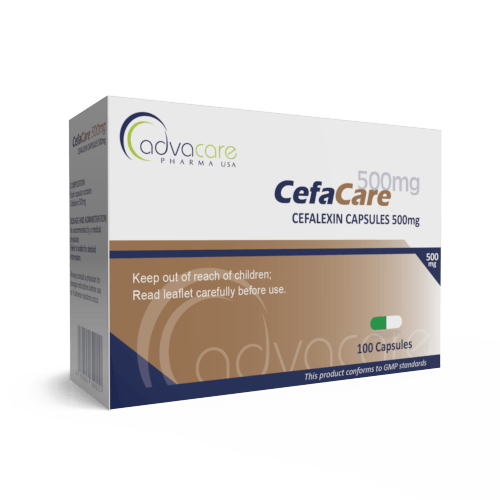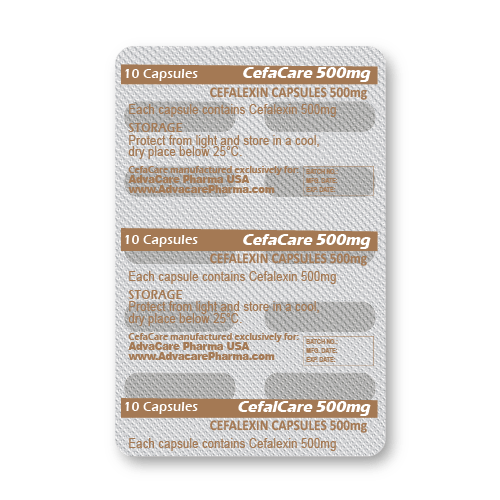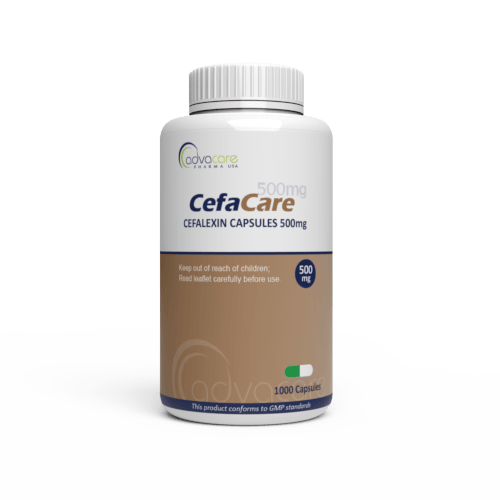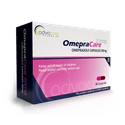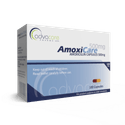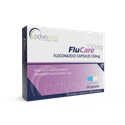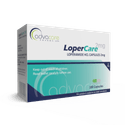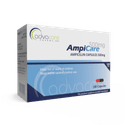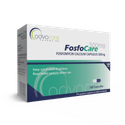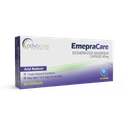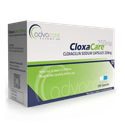- Home›
- Pharmaceuticals›
- Capsules›
- Cefalexin Capsules
Cefalexin Capsules
Dosage
Packaging
What is Cefalexin?
Active Ingredients: Cefalexin
Cefalexin Capsules are a drug used to treat bacterial infections, such as pneumonia, skin infections, and urinary tract infections (UTIs). This antibiotic can be used for those who have mild to moderate penicillin allergies, but it should not be used with those with severe allergies to penicillin.
This medicine will not treat a viral infection such as the common cold or flu.
Cefalexin is a beta-lactam antibiotic of the cephalosporin family. The active ingredient works by inhibiting protein synthesis in the bacterial cell wall. Cefalexin is effective against gram-positive and some gram-negative strains of bacteria.
This drug belongs to the first generation of cephalosporins which are beta-lactam antimicrobials. It treats bacterial infections by inhibiting the cell wall synthesis. Cefalexin inhibits bacteria by cross-linking reactions between N-acetyl muramic acid and N-acetylglucosamine in the cell wall. It has been approved by the FDA since 1971. This is one of the most widely prescribed antibiotics, and it is often used for treating superficial infections that lead to complications such as minor wounds or lacerations.
In organisms affected by bacterial infections, the synthesis of a cell wall is a normal process of bacteria, reinforced by penicillin-binding proteins. Derived from the fungus Cephalosporium sp., Cefalexin functions through its beta-lactam ring, which attaches to the penicillin-binding protein. This binding disrupts the normal activities of the protein, leading to the inhibition of bacterial cell wall synthesis. Consequently, the bacteria lose their ability to construct a cell wall, ultimately resulting in their demise. This drug is more resistant to the action of beta-lactamase.
This drug is well absorbed in the upper gastrointestinal tract with nearly 100% oral bioavailability. Unlike other drugs, it is not absorbed in the stomach but in the upper intestine. According to a study, If patients take 250mg of cefalexin, it can reach a maximum plasma concentration of 7.7mcg/ml, and if the patient takes 500mg, it can reach 12.3mcg/ml. Around 10-15% is bound to the serum proteins, including serum albumin. Over 90% of the drug is excreted in the urine after 6 hours by glomerular filtration and tubular secretion. The half-life of cefalexin is approximately 49.5 minutes in a fasted state and 76.5 minutes with food.
This drug is also available in the form of oral suspension.
AdvaCare is a GMP-certified producer of Cefalexin Capsules. This medication is manufactured in our factories in China, India, and the USA. We routinely inspect our production facilities to ensure our products meet quality and safety standards.
Why are we a quality Cefalexin manufacturer?
AdvaCare Pharma is a GMP manufacturer of Cefalexin Capsules. Our strategically located facilities ensure that our company has complete control over the supply chain, meaning higher quality products and lower costs for production, transportation and importation. Over the past 20 years, we have built a solid reputation as a leading Cefalexin manufacturer, one of the 60+ products we manufacture in capsule dosage form, across 65 countries where our pharmaceutical products are distributed.
Uses
What is Cefalexin used for?
It is used to treat some types of bacterial infections, such as:
- pneumonia and other chest infections
- skin infections
- urinary tract infections (UTIs)
- otitis media
- soft tissue infections
- bone and joint infections
- genitourinary tract infections (acute prostatitis)
- dental infections
Unofficially, this drug has unlicensed uses as prophylaxis for recurrent urinary tract infections.
How are Cefalexin Capsules used?
This medication is manufactured to be taken orally. Cefalexin Capsules should be taken with a glass of water, and they can be taken with or without food.
What dose should be taken?
The usual dose for adults is 250-500mg, taken every 8 hours.
The usual dose for children over 5 years old is 25-50mg/kg.
Refer to a doctor or pharmacist for guidelines on dosage. Do not exceed what they advise.
Who can use Cefalexin Capsules?
Cefalexin Capsules are indicated for treating infections caused by susceptible bacteria. Adding this antibiotic should be done if the antibiogram results allow this. It is indicated for treating respiratory infections, otitis media, skin infections, genitourinary and gastrointestinal infections, as well as bone infections.
Special caution should be taken for the different patient groups.
Pregnant This drug does not have any significant side effects during pregnancy, and it is not associated with teratogenicity. It is present in breast milk, but infants are exposed to less than 1% of the dose given to mothers. The drug should be added only if the benefits outweigh the risks.
However, antibiotic usage during pregnancy can lead to a lower birth weight in infants from treated mothers. Doctors and gynecologists should perform a risk-benefit analysis before prescribing any medication during pregnancy.
The use of unnecessary or harmful medication in pregnancy should be avoided, especially in the first trimester. Non-drug alternative treatments should be taken into consideration.
Neonates and Children This form of drug is usually not given to children because of their inability to swallow it. Doctors should choose other forms of this antibiotic that are appropriate to those patients.
Elderly Healthy older patients should follow the dosage recommended by their doctor. If the patient has renal impairment and the glomerular filtration rate is less than 10ml/minute, the dosage should be reduced to a daily maximum dosage of 500mg.
Can Cefalexin Capsules be used for the treatment process of viral infections?
No, Cefalexin is a cephalosporin antibiotic that is mainly used for the treatment process of bacterial infections. While viral infections may sometimes lead to secondary bacterial complications, antibiotics like Cefalexin will not treat the viral infection itself. This antibiotic should be added if the bacteria are susceptible to it.
How quickly do Cefalexin Capsules work?
The effectiveness of this drug depends individually, and varies from patient to patient. It also depends on the current health condition of the patient and the present bacterial infection. The efficiency depends on the given dose and other concurrent health conditions.
Are Cefalexin Capsules enough to treat some health conditions?
It depends; sometimes, only Cefalexin is enough to treat some health issues. However, during the treatment process, it is recommended for patients to take probiotics and other supplements. All supplements need to be discussed with a healthcare professional. Doctors should be informed about any of the patient’s current therapy and supplements whether they are prescribed or unprescribed medication.
How should Cefalexin Capsules be stored?
This drug should be stored at room temperature, away from light and moisture. The boxes should be closed and kept out of reach of children and pets. Discard any medication that is past its expiration date or if it appears cloudy or discolored.
Other warnings
This drug should not be used in patients who have had previous hypersensitivity reactions to any penicillins.
Pseudomembranous colitis might occur in patients during or after the treatment. The main concern is diarrhea and other gastrointestinal upset. The condition may range from mild to a life-threatening condition which includes severe diarrhea. Prolonged treatment might lead to pseudomembranous colitis. Also, prolonged usage might lead to superinfections. Doctors should monitor patients for overgrowth of non-susceptible organisms. Doctors should discontinue the medication if pseudomembranous colitis occurs.
This drug might lead to a false positive results in a Coombs test and glycosuria test.
Patients who take zinc supplements should avoid taking them 3 hours before or after the Cefalexin administration.
Side Effects
As with all pharmaceuticals, some unwanted effects can occur from the use of Cefalexin Capsules.
Common side effects include, but may not be limited to:
- diarrhea
- vomiting
- nausea
- vaginal itching or discharge
Seek medical attention if the following develop:
- hives or rash on the skin
- seizure
- tiredness, dizziness, or lightheadedness
- pain or swelling in the joints
- painful urination
- pseudomembranous colitis (diarrhea)
Leukopenia and thrombocytopenia are side effects that occur during or after the treatment with cephalosporins. Patients should perform regular blood testing.
For a comprehensive understanding of all potential side effects, consult a medical professional.
If any symptoms persist or worsen, or you notice any other symptoms, please call your doctor.
Precautions
Do NOT use Cefalexin Capsules if:
- You are allergic to Cefalexin or any of the other ingredients.
- You have nephritis, jaundice, or hepatitis.
- You have a blood disorder.
- You have severe diarrhea with blood or mucus.
Patients should perform regular blood tests before and after the treatment process. This indicates the efficiency of this antibiotic.
Patients should inform their doctors if they take any drugs or supplements before they take Cefalexin. Diabetic people should test urine for sugar before they take this medication.
This drug should be taken only by individuals who have a prescription. Patients should not allow anyone else to take this medication.
If patients do not have any health improvements after a few days of the treatment process, they should call a doctor as soon as possible.
If a dose is missed, patients should move on to the next scheduled dose. They should not take double doses in order to compensate for the missed dose.
This drug should be kept in the same container as it came in.
Patients who consume this antibiotic should not drink alcohol during the treatment process.
This antibiotic should be kept out of reach of children.
Possible interactions may occur with other pharmaceutical products. Consult with a doctor or pharmacist about any medications you are taking before beginning treatment.
References
A Critical Review of Cephalexin and Cefadroxil for the Treatment of Acute Uncomplicated Lower Urinary Tract Infection in the Era of “Bad Bugs, Few Drugs”
The first generation of oral cephalosporins including cephalexin and cefadroxil are traditionally considered as second-line treatment for uncomplicated lower urinary tract infections (uLUTIs). The options for treating resistant Enterobacteriaceae are limited and this study is focused on finding the best option for treatment (cephalexin or cefadroxil). The Clinical and Laboratory Standards Institute (CLSI) and the United States Committee on Antimicrobial Susceptibility Testing (USCAST) consider cephalexin more efficient.
The conclusion of this review is that both antibiotics may be used as a fluoroquinolone-sparing alternative, but cephalexin represents a more practical choice due to the reliable antimicrobial susceptibility test interpretative criteria.

You might be interested in...
Why AdvaCare Pharma?
As an industry leader, we are aware of our responsibility to provide affordable and sustainable solutions to improve healthcare worldwide.
